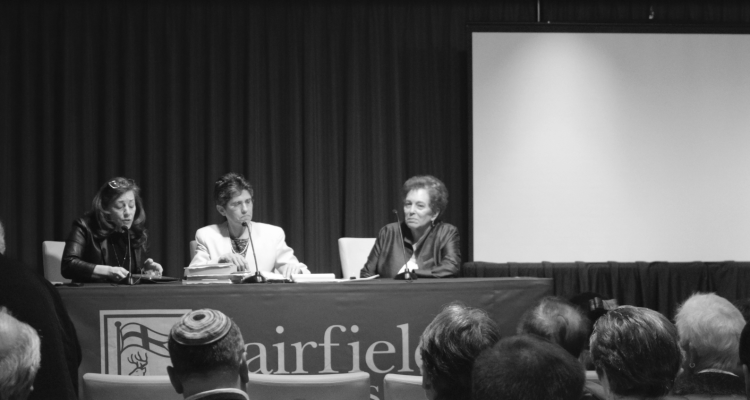Faith and feminism were the topics of discussion in the Charles F. Dolan School of Business Dining Room on Thursday, April 4 at 7:30 p.m., where Rabbi Carole Balin, Ph.D. delivered the 13th lecture in Jewish and Christian Engagement titled “Female Faith Leaders in Collaboration: Rabbis, Nuns, and Ministers for (Nearly) 50 Years.”
Fairfield University’s Director of the Carl and Dorothy Bennett Center for Judaic Studies, Ellen Umansky, Ph.D. introduced Rabbi Balin’s talk, and a response was given by Elena Procario-Foley, Ph.D. The event concluded with a panel with all three educators that featured an opportunity for audience members to ask them questions.
Rabbi Balin, the senior director of special projects at Auburn Seminary and professor emerita of history at Hebrew Union College-Jewish Institute of Religion, focused her research on collaborative, interfaith female groups, who meet “from rural Maine to Silicon Valley.” Rabbi Balin interviewed many of these groups that consisted “largely of Christians and Jews.” Though she also interviewed Buddhists, Muslims, Sikhs, Pagans and Quakers, she focused the most on Christians and Jews for the purpose of the talk.
“Women of faith come together,” she continued, “in pairs, small groups, or larger settings for fellowship, mentoring opportunities, support, advocacy and social justice work. Some have only just convened, some have been meeting for decades.”
The need for support among these women, many of whom leaders in their faiths, is often in response to the fact that many religions are only beginning to allow women to hold positions of leadership, and many have not even dared to make that step. “50 years ago, there were virtually no women leading congregations as pastors or rabbis in America,” said Rabbi Balin.
She gave a detailed history of female leadership in the United States, all within the past century. Most churches of those that allow women to be ordained didn’t do so until the late 20th Century or early 21st. Rabbi Balin used these facts as a precedent to the remainder of her talk, letting the audience keep in mind the challenges that women in leadership positions face since a large number of them are some of the first to be in such positions.
“What does it take to bridge divides?” Rabbi Balin asked herself when she began her research. “During the presentation and what is remaining of it, I will shine a light on how female-only interfaith groups are leading the way in meaningful collaboration that is decidedly different than mixed-gender groups,” she continued. “The underlying principles guiding their work can instruct, I believe, the larger project of gender tolerance, acceptance, and–we hope–embrace of religious difference in our country.” These principles, as outlined by Rabbi Balin, are relationality, situated knowledge, and radical empathy.
In her words, “relationality” is “creating trusting relationships” based on the sharing of similar stories. “Millennials and Baby-Boomers alike told me that they felt less alone and stronger in the role of religious leader because of the female friendships they forged” within interfaith female groups.
“Situated knowledges,” is a term coined by Donna J. Haraway, Ph.D. professor emerita in the History of Consciousness Department and Feminist Studies Department at the University of California, Santa Cruz, which refers to the embracing of the fact that the knowledge a person has is limited and “partial, specific and unique” to that person. As explained in the words of Haraway quoted by Rabbi Balin, once people acknowledge that reality and accept that their own knowledge is also situated in their own realities, they can partake in a “freer exchange of ideas between fellow human beings who seek to expand their limited–and she says this in a positive way–limited points of view.”
Rabbi Balin’s last principle is “radical empathy,” which describes empathy as an “intellectual self-sacrifice” in which someone uproots their own beliefs in order to understand the beliefs of another.
Rabbi Balin gave a real-life example of these principles in action in the form of a group called the Women Clergy of Charlottesville, which formed when women leaders in religious spaces in the area acted upon the need to seek out female colleagues. The group described their mission in an email to Rabbi Balin: “As women leaders who thirst for justice, we gather in love to: listen deeply, work through our differences, and learn each other’s hurts and hearts so that we may collectively affect healing, understanding, and wholeness in the community and the world.”
At the conclusion of Rabbi Balin’s talk, Precario-Foley gave a response in which she expressed that she wanted to say, “both, and.” She ended up elaborating upon and giving her own complimentary views on topics brought up by Balin, as well as asked questions that Balin then answered in the panel section.
The lecture series will continue on Wed, Apr. 10 with the Annual Commonweal Lecture in the Dolan School of Business Dining Room at 7:30 p.m. given by Editor of the Commonweal Magazine Dominic Preziosi titled “The Last Catholic Boyhood” and on Tues, Apr 16 with the Annual Bellarmine Lecture called “Saving the Earth: Ethics, Healthcare, and the Common Good” given by Andrea Vicini, S.J. from Boston College.


Leave a Reply